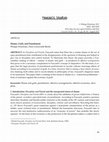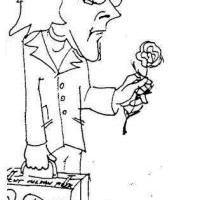Papers by Philipp Wüschner
Affective Societies, 2019
Analyzing Affective Societies, 2019
By way of an exemplary elucidation we sketch a proposal on how the development and refinement of ... more By way of an exemplary elucidation we sketch a proposal on how the development and refinement of concepts can serve as a cross-disciplinary methodology in the study of affect and emotion. We focus on the working concept of an affective arrangement which we characterize both historically and systematically and also with help of examples from recent affect research. Thereby, we provide materials for a view on the nature of conceptual practice in qualitative inquiry with broad application across the humanities, cultural studies and the social sciences.

In contemporary societies of mass communication, the rising dominance of images has gained increa... more In contemporary societies of mass communication, the rising dominance of images has gained increasing traction as a trope, in both public life and scientific discourse. Visuality and ‘the visual’ are thus increasingly critical to understanding the role of affects and emotions that resonate within any given society. Of course, analyzing this role is not the exclusive domain of art history. There are, for instance, a diverse array of empirical methods for analyzing the current flood of images, including neuroscientific approaches and algorithms1 that sort and classify images according to similarities in form, content, or style. However, art history as a philosophical discipline is less interested in statistical analysis than in hermeneutical methodologies, which demand an interpretation of singular and concrete cases. As such, art history hones a deeply embodied set of techniques and practices of interpretation that have long fostered what might be considered an embodied expertise. Ar...

‘Work on the concept’ is a key component in all scholarly and scientifi c work, regardless of whe... more ‘Work on the concept’ is a key component in all scholarly and scientifi c work, regardless of whether it takes place in the humanities or in the sciences, in cultural studies, ethnology, sociology or the arts. By ‘work on the concept’ we mean the creation, development and continuous refi nement of contentful yet concise concepts that are capable of opening up focused perspectives on selected segments of reality. Concepts enable and advance understanding by aiding a robust yet opentextured grasp of how phenomena hang together systematically. We understand concepts in a pragmatist key as action schemata that function as dynamic templates for thinking and understanding, informing observation, trained judgment, experimental and technical practices of all kinds and persuasions. What we will work toward here is a more refl ective and self-conscious understanding of how well-made working concepts inform and actively drive ongoing research – and intellectual activity more broadly – across a signifi cant spectrum of approaches dealing with affect and emotion. Researchers and scholars across the sciences and the humanities share a widespread sense for the importance of concepts. But several misconceptions about concepts hamper a clear understanding. Sometimes, concepts get confl ated with terminology. This raises what we call the ‘myth of defi nition’: the assumption that substantive concepts have a simple and stable defi nition that might be stated in a few sentences and will then settle most controversial issues surrounding a given concept. A nuisance that accompanies the myth of defi nition is that concepts for which such a concise defi nition cannot be easily provided might be disqualifi ed from learned discourse. Concomitant to the fi rst myth is a second myth, to which contemporary philosophers are particularly prone to succumb: the ‘myth of precision’. Here, the idea is that concepts must be capable of a precise and unambiguous elucidation that legislates most or all instances of their application in terms of adequacy. Even where issues of vagueness have been accommodated, the logic behind this second myth is that concepts can be detached from their situations of application, as if there was a neutral vantage point from which one could specify concept and object independently from one another and compare them in Chapter 2
Affekt Macht Netz, 2019
Die mediale Differenz zwischen online und offline wird technisch betrachtet zunehmend unsichtbare... more Die mediale Differenz zwischen online und offline wird technisch betrachtet zunehmend unsichtbarer. Anhand einer Genealogie des Trolling versucht der Beitrag nachzuzeichnen, dass diese Differenz aber nicht verschwunden ist, sondern als »hysterischer Realismus« in Affekten und ihrer Rhetorik weiter wirksam ist. Als solchermaßen vergessene ist sie ein Grund (unter anderen) für die zunehmende Gereiztheit öffentlicher Debatten.

Zwischenleiblichkeit und bewegtes Verstehen - Intercorporeity, Movement and Tacit Knowledge, 2016
In der vorliegenden Abhandlung skizzieren wir die groben Konturen eines philosophischen und inter... more In der vorliegenden Abhandlung skizzieren wir die groben Konturen eines philosophischen und interdisziplinär-kulturwissenschaftlichen Forschungsprogramms, mit dem wir das Ziel verfolgen, Affektivität als ein konstitutiv relationales und damit hochgradig soziales und insofern auch politisch bedeutsames Phänomenfeld zu erschließen. Wie lässt sich die menschliche Affektivität am besten begrifflich aufschlüsseln, damit ein adäquater Zugriff auf diese komplexen interpersonalen Dynamiken und ihre vielfältigen Wirkungen ermöglicht wird? Ausgangspunkt der folgenden Überlegungen ist, dass wir es bei Affektivität mit einem dynamischen Bezugsgeschehen zu tun haben, das sich nicht nur zwischen menschlichen Individuen abspielt und sie verbindet oder trennt, sondern selbst ein konstitutiver Faktor für Individuen – genauer: für menschliche Subjekte – ist. Affektivität ist eine Subjektivierungsinstanz par excellence.

Macht und Widerstand in der globalen Politik, 2013
Was könnte eine theologisch-philosophische Beschäftigung mit dem Märtyrer für die Politikwissensc... more Was könnte eine theologisch-philosophische Beschäftigung mit dem Märtyrer für die Politikwissenschaft leisten? Nichts, sofern nicht die theologisch-philosophische Seite des Märtyrers in ihrer politischen Wirksamkeit selbst dabei zur Sprache kommt. Dann aber, so die hier leitende Vermutung, könnte der Märtyrer als Beispiel für eine Form des Widerstands firmieren, der weder die schwierige Kategorie des intentionalen Handelns, noch den dazugehörigen subjektiven Akteur voraussetzt. Ein solcher nicht-intentionaler, nicht-subjektiver Widerstandsbegriff erhebt keinen Anspruch auf ubiquitäre Gültigkeit, könnte aber einen Zugang zu einer Dimension der Macht eröffnen, welche den sozialen und politischen Wissenschaften in der Regel versperrt bleibt, und den ich in Anschluss an Michel Foucault Mikrophysik der Macht nenne. Von hier aus ließe sich dann im besten Fall eine Erklärung finden für die unwahrscheinliche Wirkung singulärer und lokal begrenzter Ereignisse auf komplexe und globale Vorgänge.

Foucault Studies, 2017
In Discipline and Punish, Foucault states that there lies a certain shame in the act of open puni... more In Discipline and Punish, Foucault states that there lies a certain shame in the act of open punishment that contributed to the disappearance of the spectacle of shaming and helped to give rise to discipline and control instead. To illuminate this thesis, the paper provides a Fou-cauldian reading of affects – namely of shame and guilt – as produced in affective arrangements that prove to be a necessary complement to Foucault's concept of dispositive. On this basis, it argues that the legal practices of punishment predominant in secular cultures rearrange affects of shame according to an economy of guilt. In a time, however, that is seeing a clear return of excessive shaming, both online and in recent debates in philosophy of law, Foucault's diagnosis needs to be reassessed. The paper offers a reading of this return to shame as a – somewhat problematic – form of resistance against the economy of guilt.

Law and Philosophy, Jan 29, 2009
The emotions of shame and guilt have recently appeared in debates concerning legal punishment, in... more The emotions of shame and guilt have recently appeared in debates concerning legal punishment, in particular in the context of so called shaming and guilting penalties. The bulk of the discussion, however, has focussed on the justification of such penalties. The focus of this article is broader than that. My aim is to offer an analysis of the concept of legal punishment that sheds light on the possible connections between punishing practices such as shaming and guilting penalties, on the one hand, and emotions such as guilt, shame, and perhaps humiliation, on the other. I contend that this analysis enhances our understanding of the various theories of punishment that populate this part of criminal law theory and thereby sharpens the critical tools needed to assess them. My general conclusion is that, in different ways, all of the theories we encounter in this area can benefit from paying renewed attention to the nature of the connection between the stateÕs act of punishing and its expected or perceived emotional effect on the individual. I. INTRODUCTION Consider the following list of penalties to which convicted men and women in the USA have recently been sentenced (see Garvey 1998, pp. 734-737; Kahan 1996, pp. 631-634) A woman convicted of drug possession is ordered to stand on a street corner wearing a sign saying, ''I got caught possessing cocaine. Ordered by Judge Whitfield.'' An offender convicted of DWI is ordered to paste a bumper sticker on his car that reads, ''CONVICTED: DWI.'' Men convicted of soliciting prostitutes in Kansas City, Missouri, have their faces and names displayed on the local community access channel in a program popularly known as ''John TV.'' Men in San Francisco, California, are required to attend the
Emotion Review
We introduce the working concept of “affective arrangement.” This concept is the centerpiece of a... more We introduce the working concept of “affective arrangement.” This concept is the centerpiece of a perspective on situated affectivity that emphasizes relationality, dynamics, and performativity. Our proposal relates to work in cultural studies and continental philosophy in the Spinoza–Deleuze lineage, yet it is equally geared to the terms of recent work in the philosophy of emotion. Our aim is to devise a framework that can help flesh out how affectivity unfolds dynamically in a relational setting by which it is at the same time modulated in recurring ways. With this orientation, this article contributes to the interdisciplinary study of situated affectivity and to the theoretical and conceptual unification of distinct strands of research from several disciplines.
Der Text verfolgt eine Genealogie des Trolling und zieht Konsequenzen für den "hysterischen Reali... more Der Text verfolgt eine Genealogie des Trolling und zieht Konsequenzen für den "hysterischen Realismus", der zunehmend die Rhetorik online und offline bestimmt, zu einem Zeitpunkt, da genau diese mediale Differenz zwischen on- und offline zu verschwinden beginnt.
Mühlhoff, R.; Breljak, A.; Slaby, J. (Hrsg.): Affekt Macht Netz. Auf dem Weg zu einer Sozialtheorie der Digitalen Gesellschaft. Transcript 2019, ISBN 978-3-8376-4439-5, S. 187-208.
Wie männlich ist Autorität? Feministische Kritik und Aneignung, 2018
Die Rede von einer Krise der Autorität ist nicht unbedenklich, dient sie doch häufig nur als Vorr... more Die Rede von einer Krise der Autorität ist nicht unbedenklich, dient sie doch häufig nur als Vorrede für einen Aufruf zur Rückkehr zu autoritären Formen. Deswegen möchte ich stattdessen zeigen, dass in den Krisenformen der Autorität Muster wirksam sein können, die vielleicht nicht selbst als Au-torität erscheinen, die aber dennoch dazu beitragen, autoritäre Strukturen aufrechtzuerhalten. Ich möchte im Folgenden über eine (eher) männliche Geste nachdenken, in der die angedeutete Rücknahme der eigenen Autorität zugleich ihr Fortbestehen sichert, und die ich Jovialität nenne. Jovialität ist keine Form von Autorität im strengen Sinne, sie ist Ersatzhandlung, die das, was sie ersetzt, gleichwohl fortschreibt.
The authors argue that the work of art historian Aby Warburg (1866-1929) – especially his idea of... more The authors argue that the work of art historian Aby Warburg (1866-1929) – especially his idea of pathos formula – entails fragments of a theory of affectivity, its formalization, dissemination as well as its historicity. Pathos formulas “freeze” moments of high affective intensity and create “dynamograms” that work as intensifiers by arranging the affective dynamics in any given medium (though Warburg focused mainly on visual media). As a formalization, a pathos formula enables affectivity to be stored, to be transmitted through time and space, to be reiterated and even reenacted. Pathos formula is a key concept to address the relation between affectivity and form in a historical perspective.
Analyzing Affective Societies: Methods and Methodologies (Routledge), 2019
By way of an exemplary elucidation we sketch a proposal on how the development and refinement of ... more By way of an exemplary elucidation we sketch a proposal on how the development and refinement of concepts can serve as a cross-disciplinary methodology in the study of affect and emotion. We focus on the working concept of an affective arrangement which we characterize both historically and systematically and also with help of examples from recent affect research. Thereby, we provide materials for a view on the nature of conceptual practice in qualitative inquiry with broad application across the humanities, cultural studies and the social sciences.

Foucault Studies, 2017
In Discipline and Punish, Foucault states that there lies a certain shame in the act of open puni... more In Discipline and Punish, Foucault states that there lies a certain shame in the act of open punishment that contributed to the disappearance of the spectacle of shaming and helped to give rise to discipline and control instead. To illuminate this thesis, the paper provides a Fou-cauldian reading of affects – namely of shame and guilt – as produced in affective arrangements that prove to be a necessary complement to Foucault's concept of dispositive. On this basis, it argues that the legal practices of punishment predominant in secular cultures rearrange affects of shame according to an economy of guilt. In a time, however, that is seeing a clear return of excessive shaming, both online and in recent debates in philosophy of law, Foucault's diagnosis needs to be reassessed. The paper offers a reading of this return to shame as a – somewhat problematic – form of resistance against the economy of guilt.
Aus der Antike treten unter dem Begriff der hexis zwei Anwendungsfälle zum Vorschein, die noch he... more Aus der Antike treten unter dem Begriff der hexis zwei Anwendungsfälle zum Vorschein, die noch heute das Nachdenken über Haltung informieren können. Der erste betrifft die (moralische) Beurteilbarkeit von Personen, der andere den Umgang mit der eigenen Affektivität, das heißt den aktiven Vollzug dieser Affektivität. Beide sind, was nicht überraschen dürfte, miteinander verknüpft: Der Umgang mit den Affekten selbst ist es, der als Haltung in der Antike zum Kohärenzkriterium des moralischen Charakters wird. Indifferenz und Einsamkeit werden hier als Versuch verstanden, sich dieser Kohärenz subversiv zu entziehen.











Uploads
Papers by Philipp Wüschner
Mühlhoff, R.; Breljak, A.; Slaby, J. (Hrsg.): Affekt Macht Netz. Auf dem Weg zu einer Sozialtheorie der Digitalen Gesellschaft. Transcript 2019, ISBN 978-3-8376-4439-5, S. 187-208.
Mühlhoff, R.; Breljak, A.; Slaby, J. (Hrsg.): Affekt Macht Netz. Auf dem Weg zu einer Sozialtheorie der Digitalen Gesellschaft. Transcript 2019, ISBN 978-3-8376-4439-5, S. 187-208.